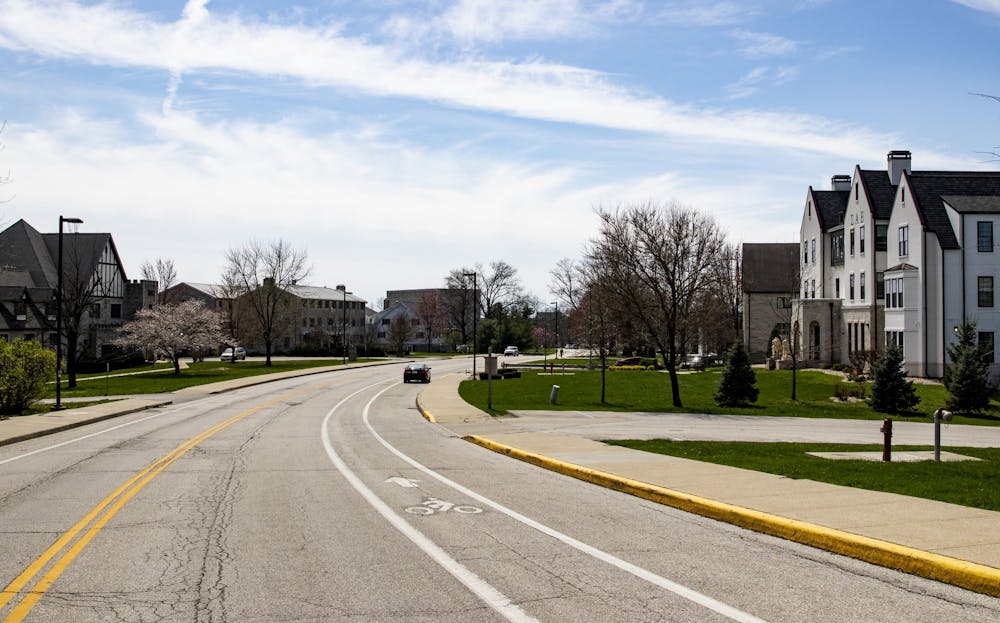IU spokesperson Chuck Carney announced in a Thursday press conference IU will recommend all 40 greek houses be closed as a result of high COVID-19 positivity rates.
Dr. Aaron Carroll, IU’s director of mitigation testing, said plans to create a safe environment for greek students to return failed. Carney and IU Provost Lauren Robel said because of “alarming” COVID-19 positivity rates in greek houses, students will be forced to find alternative housing.
Carroll added Monday’s mitigation testing showed a spike in positivity rates, jumping from 8.1% among greek residents to more than 20%.
IU released mitigation testing data Monday for the first week of classes. That came after 11 greek houses had already been placed on quarantine because of high positivity rates.
As the week continued, the number of greek houses in quarantine increased to 30. Some houses, according to a release from IU, had positivity rates of more than 50%.
Acacia has the highest positivity rate at 87.50% as of Monday. Alpha Epsilon Pi, Phi Delta Theta, Phi Sigma Kappa and Sigma Phi Epsilon all have positivity rates higher than 50% as of Monday, according to IU’s website data.
IU also reports Alpha Chi Omega, Kappa Kappa Gamma, Phi Delta Theta, Pi Beta Phi and Sigma Alpha Epsilon all have at least 20 live positive COVID-19 cases since Aug 19.
The school does not, however, have the authority to shut the greek houses down themselves. This is a recommendation for the chapters to close. Greek houses at IU are owned by housing corporations, landlords or parent organizations, not the university.
“The university can’t really do anything about that,” Robel said if the chapters refuse to close.
Monroe County public health officials, however, do have the authority to close greek houses.
Should the chapters follow the school’s guidance to close, students will have to find alternate housing either in Bloomington or go back home. Robel said the school will assist greek residents to find alternative housing. The university also expects the housing corporations and national chapters to assist students.
However, that is limited to availability. IU will not put greek residents in dorms.
Robel said students who are already quarantining or isolating will not immediately be forced to leave.
Carroll does not expect greek residents to return to their houses this semester, if the organizations follow the school’s guidance. He said because having them in a communal living space didn’t work the first time, he doesn’t anticipate the school putting them back in those environments.
The recommendation, however, does not mean IU will be moving classes fully online. Both Carroll and Dr. Cole Beeler, IU’s director of symptomatic testing, said they are not seeing a spread of the coronavirus in classrooms.
Beeler said the school is looking at 16 to 20 different metrics each day which help determine the safety of holding classes in person. Robel said classes will be moved online if IU determines it cannot handle the situation.
Students in the greek houses are not facing suspension from IU for violating the schools COVID-19 policies, Robel said. Robel said the university suspended students at the beginning of classes because of a party over the week before classes started.
The IU Interfraternities Council released a statment in response to the school's recommendation to close houses.
The North American Interfraternity Conference also released a statement following the school's recommendation:
The health and safety of members and the community is the top priority for fraternities at IU. Fraternities and housing corporations are following public health guidelines. Facilities should remain open with quarantine protocols in place to isolate members within chapter houses to minimize further coronavirus exposure. As Dr. Anthony Fauci discussed just yesterday, we believe it is wrong to move students from their current quarantined locations and risk spreading infection to different places in the community. Students are learning—just like we all are—as we navigate this unprecedented time. Since the spring, fraternities have been planning and preparing facilities based on local public health guidelines. However, the greatest governing engine on a college campus is not the administration or public safety. It’s student culture. It’s peer pressure. All campus stakeholders must work together to mitigate virus spread.
This story was updated at 4:04 p.m. Thursday to include statements from the fraternity councils.




